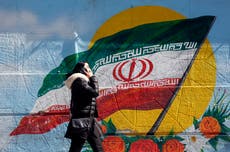Thousands of Iranians protest over dried-up river
‘Give us back the Zayandeh River,’ chanted protesters
Your support helps us to tell the story
From reproductive rights to climate change to Big Tech, The Independent is on the ground when the story is developing. Whether it's investigating the financials of Elon Musk's pro-Trump PAC or producing our latest documentary, 'The A Word', which shines a light on the American women fighting for reproductive rights, we know how important it is to parse out the facts from the messaging.
At such a critical moment in US history, we need reporters on the ground. Your donation allows us to keep sending journalists to speak to both sides of the story.
The Independent is trusted by Americans across the entire political spectrum. And unlike many other quality news outlets, we choose not to lock Americans out of our reporting and analysis with paywalls. We believe quality journalism should be available to everyone, paid for by those who can afford it.
Your support makes all the difference.Thousands of Iranians angered over the drying of a treasured waterway poured into the parched riverbed on Friday to protest environmental and water mismanagement, confronting the government of hardline President Ebrahim Raisi with its first domestic crisis.
Videos of the protests showed thousands of people filling the riverbed and standing along the famous 10th Century 33-arch bridge that is a signature of Isfahan, former seat of Iran’s Safavid empire. Demonstrators filled the horizon, and observers described the gathering as potentially Iran’s largest-ever environmental protest.
“Give us back the Zayandeh River,” they chanted, whilst clapping hands.
In a startling contrast to most anti-government protests in Iran, state media covered Friday’s rally, which began more modestly earlier this week when farmers frustrated over the lack of water gathered on the riverbed. But the protest drew more supporters, and many joined the farmers following Friday prayers.
“The return of water to the Zayandeh River is not the demand of one particular group,” said a state television broadcaster covering the rally. “It’s the demand of all the people of Isfahan.”
The government appeared eager to respond to protesters’ demands. Mr Raisi’s deputy, first vice-president Mohammad Mokhber ordered the energy and agriculture ministers to urgently address the issue by distributing water for agriculture and to find ways to revive the Zayandeh River, which courses through the ancient city of Isfahan, a city of turquoise-tiled architectural gems that was for centuries the capital of Iran.
“One of the most important problems the public is facing, at the moment, is water supply,” Mr Raisi was quoted as saying during a meeting Friday with environmental activists and officials, according to his website.
“Managing water resources must receive our urgent action through optimal use of water, and paying special attention to the ecological potentials which can offer many solutions.”
Iranians in rural provinces have long protested the water management policies of the authorities. Protests have occasionally turned violent, including last summer in the country’s southwest.
Environmental scientists have for years warned that a combination of drought and poor water resource management was parching the nation.
A major cause of the depletion is unrestrained groundwater extraction for agriculture and industry, often using government-subsidised fuel to drill and draw from underground reservoirs. Local news outlets and officials have alleged that half of water wells in the country are unauthorised, and that a third of the water drawn was illegal.
Another cause is more than 700 large dams which scientists allege were built by the government with little concern for environmental implications.
It remains unclear why the authorities have allowed the protests this week to gather steam while ordinarily deploying police and ideologically motivated paramilitaries to crush similar protests in recent years.
Elected in August, Mr Raisi is among those Iranian officials being groomed to lead the country after the passing of Supreme Leader Ali Khamenei, who is 82-years-old. Unlike his predecessor Hassan Rouhani, Mr Raisi has the support of the country’s powerful Revolutionary Guard and the security forces, but is largely mistrusted and disliked by the country’s educated middle classes.



Join our commenting forum
Join thought-provoking conversations, follow other Independent readers and see their replies
Comments